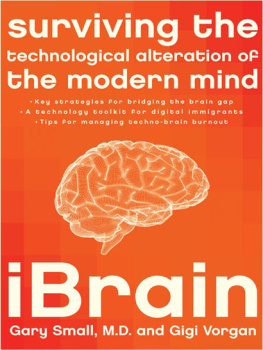The Alzheimers Prevention Program
Keep Your Brain Healthy for the Rest of Your Life
GARY SMALL, M.D.
DIRECTOR OF THE UCLA LONGEVITY CENTER
& GIGI VORGAN
AUTHORS OF THE MEMORY BIBLE
WORKMAN PUBLISHING NEW YORK
Contents
Acknowledgments
We are grateful to the volunteers and patients who participated in the many research studies that inspired this book. We also thank Diana Jacobs for her drawing of the human brain, Prabha Siddarth for her statistical input, our tireless and creative publicists Selina Meere and Courtney Greenhalgh, and our colleagues and friends who provided their guidance and input, including Susan Bowerman, Rachel Champeau, Mindy Gandin, Dr. Rob Gandin, Dr. David Heber, Jeffrey Nemerovsky, and Don Seigel. We are eternally thankful to our longtime agent and dear friend, Sandy Dijkstra, who has inspired our writing for many years; our talented publisher, Bob Miller; our gifted chief editor, Susan Bolotin; and our longtime friend and extraordinary editor, Mary Ellen ONeill. This book would not have been possible without the love and support of our parents, Gertrude and Dr. Max Small and Rose and Fred Weiss, and our children, Rachel and Harry.
NOTE: The stories contained in this book are composite accounts based on the experiences of many individuals and do not represent any one person or group of people. Similarities to actual persons are coincidental and unintentional. Readers may wish to consult with their physician before initiating any diet or exercise program.
Preface
For decades, researchers have been searching for a way to cure Alzheimers disease, by far the most common cause of age-related mental decline. Despite considerable progress, no miracle remedy has yet been discovered.
But we dont need to sit and wait for a remarkable new drug or vaccine to come along before we start protecting our brains from this devastating disease. The Alzheimers Prevention Program offers strategies to help delay symptoms from emerging. The scientific evidence points to prevention as todays most effective way to defend against Alzheimers. If we can stave off the onset of dementia long enough for people never to experience symptoms in their lifetimethat in itself could be considered a cure.
Genetics accounts for only part of the risk for Alzheimers disease, and we now know that lifestyle choices have a tremendous impact. A lifestyle that promotes brain health not only strengthens neurons and postpones mental decline, it also improves memory ability and brain efficiency right away. No matter where you are in your health profileeven if you exercise every day and eat all the right foods to keep your body and brain healthythis program will still help you feel better and delay Alzheimers disease longer. Whether youre a student, thirty-something, baby boomer, or senior, you will benefit quickly from practicing Alzheimers prevention strategiesand youll have fun doing it. Its never too early or too late to start protecting your brain. The Alzheimers Prevention Program will show you how to get your brain healthy and do all you can to keep it that way for the rest of your life.
Gary Small, M.D., and Gigi Vorgan
Los Angeles, California, January 2012
CHAPTER 1
Prevention Is Todays Best Defense
You cant turn back the clock, but you can wind it up again.
Bonnie Prudden, pioneer of myotherapy
One evening my wife, Gigi, and I were leaving a restaurant when we spotted a well-known actress sitting at a table in the corner. We immediately recognized her, but we just couldnt come up with her name. As we walked toward the car, we tried prompting each other with what we could rememberleading men shed worked with, a couple of her husbands, and that epic movie where she played a queen of England. We both felt so close to coming up with her name, but it just wouldnt pop into our brains. Finally, Gigi blurted out the actresss name. I asked how she was able to recall it, and she smugly reminded me that she was seven years younger than I.
She had a point. Age is the single greatest risk factor for developing memory loss. Most people over 40 begin to notice momentary recall delays and word-finding glitches similar to our tip-of-the-tongue experience at the restaurant. If the frequency of these experiences increases, it can be disconcerting, but it certainly doesnt mean that Alzheimers disease is hovering in a dark corner. However, many of us still harbor a gnawing concern that our memory pauses could signal something more ominous.
In the U.S. nearly 80 million baby boomers, born between 1946 and 1964, are reaching the age when memory slips become more frequent, and theyre concerned about it. Large-scale surveys show that more than 60 percent of middle-aged and older people have memory complaints, but only one out of five of them discusses these complaints with their doctor. Some may be frightened of what they could find out, or maybe they simply forget to tell.
Baby boomers are quite aware of the rising tide of Alzheimers disease, perhaps the most overwhelming epidemic the world may ever see. Every 70 seconds, another American gets Alzheimers disease, and by midcentury, a new case will develop every 30 seconds. Currently, 36 million people worldwide suffer from the disease. By 2050 we can expect 115 million cases of Alzheimers, causing tremendous emotional distress and economic hardship.
The current wave of afflicted patients is already incurring a staggering price. In 2010 the estimated worldwide costs of medical and social care as well as informal care from unpaid family members and others totaled $604 billion. This figure accounts for approximately 1 percent of the worlds gross domestic product. If caring for dementia were done by a company, its annual revenue would exceed that of Walmart.
The Alzheimers Fear Factor
A friend recently told me that after shopping at a large mall, he couldnt find his car in the lot. He couldve sworn he had parked on level B, section 25, but he was obviously losing it. He felt his memory was goingand fast. A security guard drove him around the lots several levels looking for his Mercedes, but he still couldnt find it. My friend started panicking. Maybe he wasnt just getting Alzheimers, maybe he also had a brain tumormalignant... Just then the security guard said theyd had several upscale cars stolen in the last month, many of them Mercedes. My friend almost cried with reliefhis car had been stolen! Thank God!
Most baby boomers are terrified of Alzheimers disease. Many have witnessed people in their parents generation fall prey to its horrible effects. Some have endured the helplessness and pain of watching someone they love gradually fade away.
But todays proactive boomers dont plan to sit back and take it. They grew up during the tumultuous 60s and 70s and have no qualms about facing a challenge and testing conventional wisdom. As theyve aged, many baby boomers have embraced the concept that an active lifestyle can keep them feeling healthy and young. They know about the research confirming that the same lifestyle choices that protect the body also protect the mind. Physical exercise, a nutritious diet, mental stimulation, and stress reduction have their greatest impact when people combine these strategies and continue them for several years.
Taking Control of Your Brain Health
As these millions of baby boomers approach age 65, when their risk for Alzheimers disease begins to accelerate, are they all headed for disaster? Are they facing an inevitable future of mental decline and dementia? The answer is a definitive no. We










